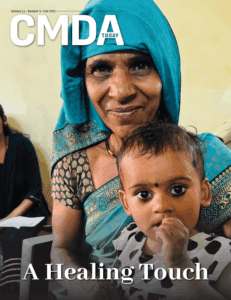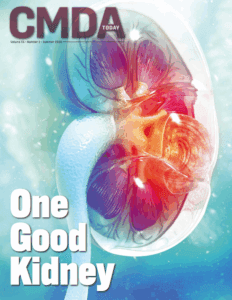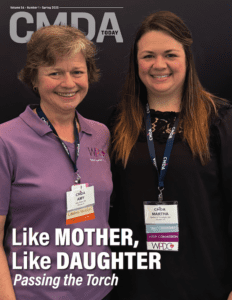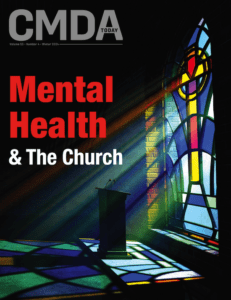The Path of Life: My Journey to Help Rescue the Pre-born
As I look back on my path, I realize that what God used to guide my steps weren’t earth-shattering events, but rather small moments that probably seemed inconsequential to others. To me, however, those moments brought me to a place where I could see God’s mercy and power in ways I never imagined.
by Christina Francis, MD
I stepped out of the door into the crisp, fresh air on the early morning of December 1, 2021 and started the short walk to the U.S. Supreme Court in Washington, D.C. As the sun rose on this historic day, I looked back at the group that accompanied me. Nearly 80 physicians and other healthcare professionals had traveled to Washington, D.C. from all over the country, in the middle of the week, leaving busy practices, to stand in solidarity for the dignity of our patients. Never had I imagined we would gather so many healthcare professionals on that day, nor that we would be there for what could be the case that finally overturns the travesty of Roe v. Wade. The excitement and anticipation were palpable as we reached the front of the Supreme Court. As I looked out over our small sea of white coats, I couldn’t help but marvel at the journey the Lord has taken me on to bring me to this place.
As I look back on my path, I realize that what God used to guide my steps weren’t earth-shattering events, but rather small moments that probably seemed inconsequential to others. To me, however, those moments brought me to a place where I could see God’s mercy and power in ways I never imagined.
The first small moment occurred with my initial visit to what would eventually be my alma mater, Ball State University in Muncie, Indiana. Growing up, I had dreams of one day being a marine biologist. Though my father had warned me a marine biology career would be more than just “swimming with the dolphins,” I was certain (in a 17-year-old kind of way) that was what I wanted to do. During my campus visit, we met with two encouraging biology professors who listened patiently to all my aspirations. Toward the end of our discussion, they said something that eventually changed my path. They exhorted me to pursue whatever I was passionate about. They also proceeded to tell me that I would have to get a doctorate to even have a chance of finding a job in that field, and even then, it wasn’t guaranteed. While their comments may have sounded discouraging, they were illuminating for me and prompted me to consider where my passions truly lie. What I discovered through that process was that, while I did love science and the process of scientific discovery, I wanted to use it to be the hands of Christ. That is what led me to medicine, and I am eternally grateful it did. Now, I can’t imagine choosing a different vocation. How blessed we are as healthcare professionals to be a part of our patients’ lives, through their joys and sorrows, and to care for them during those times with compassion, excellence and integrity.
A year or so after starting my undergraduate studies, I attended a youth missions conference. The exhibit hall was filled with what seemed like hundreds of organizations that were all there to help young people serve on the mission field. In the midst of numerous organizations with elaborate exhibits, I had my next small moment. An unassuming booth with a simple display of photos of children stopped me in my tracks. The smiles on their dirty little faces and the joy radiating from their eyes tugged at my heart. A few months later, I was headed to Romania to spend five weeks living in an orphanage and ministering to about 75 children. My life and my heart were changed. Experiencing the love and provision of Christ through ministry to these children helped me understand Him in a way I don’t think would have been possible otherwise. I saw perseverance and joy in the face of such adversity. I experienced the wonder of a well-known scriptural truth through the eyes of a child hearing it for the first time. It was during that time in Romania, while having Bible study with my team and several of the older children in the orphanage, I realized this is how God wants me to serve Him with my life—through healthcare missions.
Fast forward to my second year of medical school when my next small moment occurred. My goal of practicing medicine in the developing world was the lens through which I viewed the various medical specialties offered. My initial thought was pursuing family medicine or combined internal medicine and pediatrics in order to have the broadest knowledge base and enable me to take care of as many types of patients as possible. This all changed in a moment in the delivery room of a woman I didn’t even know. I was shadowing a family medicine physician when he was called to the hospital for a patient who was in labor and nearing delivery. I was so excited to go with him and see what a delivery was like. For reasons I can’t remember, I didn’t take part in the delivery, but I was able to watch the entire process. As I witnessed the miracle of a new life coming into the world (the ex-utero world anyway), tears sprang to my eyes, and I realized this was one of the most amazing things I had ever seen. How remarkable that God made women’s bodies to grow and nurture a child, then deliver that child and continue to sustain him or her! What an amazing picture of the goodness of our Creator.
In that moment of awe, I sensed someone standing close to me. I looked over to see the seasoned labor and delivery nurse who was waiting to receive the baby at the warmer. She leaned over to me and said, “Oh, honey, if this makes you cry, you need to do this for a living!” One sentence, said in the emotion of the moment, spoken to someone she didn’t even know, focused my vision where it needed to be. I realized she was right—my specialty had chosen me. As I progressed through my third- and fourth-year rotations, nothing inspired me more than being with a woman and her family as they welcomed a new baby or being able to comfort a family through a devastating loss, ensuring they received the compassionate support they needed. The challenge of caring for two patients at once—one born, one pre-born—still excites me. I feel privileged to do so.
I continued to participate in short-term healthcare mission trips throughout medical school and residency, including trips to Myanmar and Afghanistan, anxiously anticipating the day I could do so full-time. In the final year of my Ob/Gyn residency, I was accepted to the Post-Residency Program through Samaritan’s Purse. There were myriad places that desperately needed an Ob/Gyn physician to come serve, and I felt overwhelmed trying to choose. Africa had always fascinated me. I had longed to go one day, but Africa is a large continent with countless locations with significant need. After praying and seeking wise counsel, I asked the Lord to somehow make clear where I should go. Then I heard about Kapsowar Mission Hospital in Kenya. It is a rural hospital, with approximately 150 beds, that had not had an Ob/Gyn for more than 20 years, despite serving a population surpassing 300,000.
After spending a month there as a fourth-year resident, I knew I had found my home. The warm welcome I received when I moved there confirmed my decision. Despite the challenges of not always having the necessary resources, or the heartbreak of losing babies that would have survived in the U.S., I loved serving the Marakwet people and learned so much from them. I learned the art of true hospitality and the importance of placing relationships ahead of schedules. I learned patience and that true hope for my patients doesn’t come as a result of my efforts as a physician, but from Jesus Christ, the Great Healer. What a privilege it was to freely pray with my patients in times of joy, uncertainty and sorrow. I was blessed with an amazing support system of other missionaries and Kenyan friends and could not imagine ever living or serving the Lord anywhere else.
After my first two years in Kenya with Samaritan’s Purse, I returned to the U.S. for a planned 18-month break to collect my case lists, take my oral board exam, switch sending agencies and then return to Kenya full-time. Or so I thought. Little did I know how deeply I would come to understand Proverbs 16:9, “The heart of man plans his way, but the Lord establishes his steps” (ESV). My final small moment occurred during a weighty conversation with my best friend. She had recently been encouraged by her pastor, during 40 Days for Life, to watch or read something about abortion daily for 40 days. Never one to back down from a challenge, she did just that. What she discovered lit a fire in her to do more to protect innocent pre-born children.
One day she was telling me about all she had learned, and she said “Christina—you’re a Christian, you’re an Ob/Gyn, you’re a woman and you say that you’re pro-life, but I think you could be doing more.” I was stunned for a moment. I grew up in a Christian home, I’ve always been pro-life, and I’ve never done or recommended an abortion. All the excuses and defenses ran through my head until I realized she was right. I could do more—and I should. As an Ob/Gyn, the Lord had uniquely positioned me to be able to speak up for the lives of my pre-born patients, and yet, I had been quietly skating by—talking to my patients individually but never speaking out publicly against the atrocity of abortion. She challenged me to consider what practical ways I could speak up for the pre-born.
Thus began my journey to learn more about the reasons I was pro-life. It wasn’t enough to say I was a Christian, though my Christian worldview certainly forms my view of inherent human dignity. I needed to be able to give a reason for my pro-life position to anyone who asked. I was floored the first time I heard Scott Klusendorf from Life Training Institute1 lay out the reason- and logic-based defense of life. It all comes down to what we believe the pre-born are. As Stand to Reason2 Founder Greg Koukl says, “If the unborn are not human beings, then no justification for elective abortion is needed. However, if the unborn are human beings, then no justification for elective abortion is adequate.” The more I learned and read, the more apparent it became to me that I could no longer be silent. I had to do more. My “call to arms” occurred during a visit to the United States Holocaust Memorial Museum in Washington, D.C. Surrounded by evidence of the relative lack of response of the U.S. to the bloodshed and suffering of millions of innocent people, I found myself wondering how anyone could have known what was happening and ignored it. In that moment, I knew I had to do more to try to stop the slaughter of millions of pre-born children and the harm inflicted on their mothers due to abortions.
I must admit that path was not a smooth one. My pride took over. I had been telling everyone for years now that I was planning to be a healthcare missionary for the rest of my life. How could I go back on my word? Would I be perceived as taking the easy way out, not able to “hack it” on the mission field? Through praying, seeking wise counsel and struggling with God, I realized I wasn’t going back on my word or abandoning the Lord’s plans. Pre-born children, who are dependent and vulnerable and labeled disposable by the world, are just as much a mission field as rural Kenya. In addition, the policies and attitudes surrounding abortion in the U.S. influence policies around the globe. So, while my specific mission field is now different than I expected, I am still serving the Lord by caring for the vulnerable and the fatherless and helping others see the value of those whom society discards.
It was during this time of soul searching I was introduced to the American Association of Pro-life Obstetricians and Gynecologists (AAPLOG), a professional medical organization dedicated to equipping its members—pro-life medical professionals—with the evidence-based rationale for a pro-life position and to defend the practice of Hippocratic medicine. I have been honored to serve on the AAPLOG board for the last seven years and am currently chairman of the board. Through my involvement with AAPLOG, I have learned about the extensive damage caused by abortion procedures and the lies furthered about them to women. Abortion truly is the greatest injustice we face today as a society and as a profession.
It was this injustice that led us to organize the sea of healthcare professionals in front of the Supreme Court last December, along with amazing partners like CMDA. On the day of oral arguments in the case of Dobbs v. Jackson Women’s Health Organization, we had the privilege of boldly declaring that abortion is not healthcare! It ends the life of at least one of our patients and harms the other, both physically and mentally. We struck a chord that day. Seeing all of us in front of the Supreme Court demonstrated to others that they too can stand up for what’s right—defending the defenseless and speaking for the voiceless. Never had I imagined myself speaking in front of thousands on the steps of the Supreme Court. It was only by the Lord’s grace and equipping I was able to do so. Each of the small moments in my life led me to that place on the steps. As healthcare professionals, we have a duty and a calling to defend and care for the vulnerable. Be bold in your convictions, be faithful to that duty and know you are not alone!
Christina Francis, MD, is a board-certified OB/Gyn who currently works in Fort Wayne, Indiana as an OB/Gyn hospitalist. Dr. Francis completed medical school at Indiana University in 2005 and completed her OB/Gyn residency at St. Vincent Hospital in Indianapolis, Indiana in 2009. She is Chair of the Board of the American Association of Pro-life Obstetricians and Gynecologists, an associate scholar with the Charlotte Lozier Institute, a board member of Indiana Right to Life and a physician member of the Abortion Pill Reversal Network. As a pro-life speaker, Dr. Francis offers her medical expertise, knowledge of bioethics and pro-life reasoning both here in the U.S and around the globe. She has always had a passion for human rights, spending a significant portion of her life in various countries working tirelessly on behalf of women and children. Dr. Francis worked for three years as the only OB/Gyn at a mission hospital in rural Kenya until returning to the U.S. in 2014 to work on behalf of women and children, both in the U.S. and internationally, who are often victims of the abortion industry. She has written on issues surrounding women’s health and abortion for publications including the Wall Street Journal, Newsweek and USA Today.
Sidebar
For nearly 50 years since Roe v. Wade was passed, abortion has been a blight on our country. However, December 1, 2021 was an amazing and historic day for LIFE! CMDA CEO Dr. Mike Chupp and Senior Vice President of Bioethics and Public Policy Dr. Jeff Barrows were joined by a dozen or more CMDA members on the steps of the U.S. Supreme Court as oral arguments were heard on Dobbs v. Jackson Women’s Health Organization.
This case is challenging a law passed in Mississippi in 2018 that bans abortion after 15 weeks’ gestation, except for cases of medical emergency. At the time this article goes to print, we are still waiting for a decision from the court. Nevertheless, more than ever before, we know this case has the opportunity to speak to the value and intrinsic worth of human life, created in the image of God. It is time for the law of our land to catch up with advances in medical science and support the human rights of all of our patients. We know God is hearing our prayers as we petition Him to move mightily and miraculously to protect the unborn.
So what’s next? Will you prayerfully consider getting involved in CMDA’s grassroots advocacy efforts in your individual state? State legislatures responded quickly with a plethora of new bills in response to this abortion case, and we need your help to promote life in all 50 states. As Christians, we have a responsibility from Christ to be defenders of our faith in the public square. To get involved with CMDA’s advocacy efforts, contact [email protected].
Please continue to pray for CMDA and for us to always be faithful in our mission to “educate, encourage, and equip Christian healthcare professionals to glorify God.” Obeying the clear biblical instruction to “Speak up for those who cannot speak for themselves; ensure justice for those being crushed” (Proverbs 31:8-9, NLT) is clearly one way that together we can glorify God. In doing so, we protect the lives of the least and littlest of these who are made in His image.
Footnotes
- Life Training Institute at prolifetraining.com
- Stand to Reason at str.org




